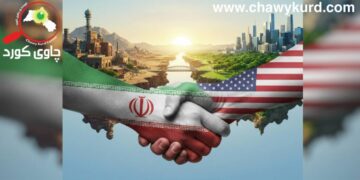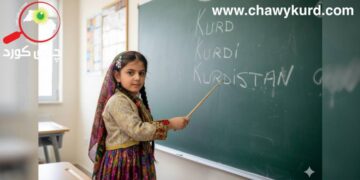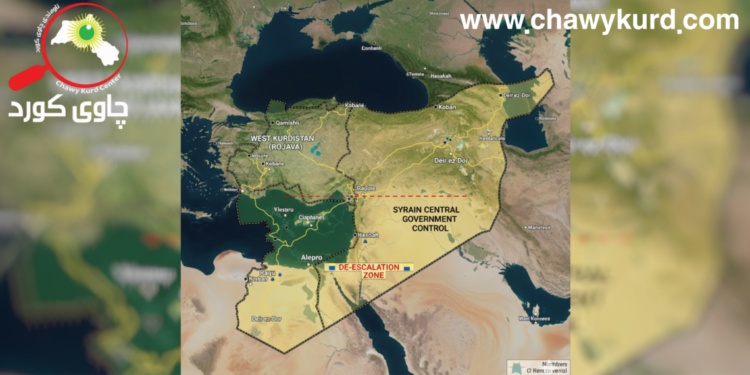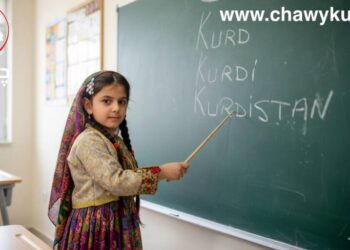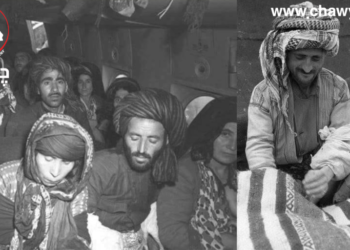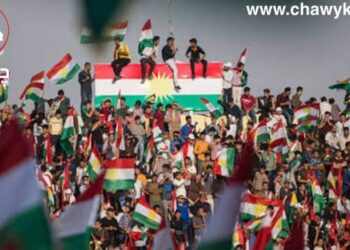In 2003, Syria’s population was estimated at 18.2 million, divided among various religious and ethnic minorities. There are no official statistics for the Kurdish population in Syria; estimates vary, with Nicholas van Dam placing it at 8.5%, Ismet Sheriff Vanly at 9.10%, and Karim Yildiz at 8.10%, estimating between 1.5 to 2 million people. Kurds are primarily concentrated in the Jazira (Hasakah) province, Afrin, and Kobani in Aleppo province, with a smaller number in Damascus and central Aleppo. Approximately 40% of Syrian Kurds reside in Jazira, 30% in Aleppo province, and the rest are spread across Damascus and Aleppo city.
This part of Kurdistan, until the Ba’ath Party’s rise to power in 1963, was largely under French administration. Kurds were engaged in a struggle for their political, national, and cultural rights. Following the establishment of the Republic of Turkey in 1923 and the failure of Kurdish uprisings in 1925, 1931, and 1937, many Kurdish revolutionaries and intellectuals fled to French-controlled Syria. They settled in various regions of Syria and Kurdistan, initiating political and cultural activities. Notable figures include the Bedirkhan brothers, like Celadet Bedirkhan, who worked extensively on revitalizing the Kurdish language through publications like “Hawar” and “Ronahi.” Several cultural and political organizations emerged during this period, facing significant opposition from Arab chauvinists until the establishment of the Syrian Kurdish Democratic Party in 1957. Unlike Northern and Southern Kurdistan, Rojava’s liberation movement in this phase was not armed, largely due to French administrative policies and the political status of Kurds. Kurds played a significant role within the Syrian administration, reaching high military ranks and even the presidency. However, after the Ba’athists came to power, the situation for Kurds deteriorated, and they were deprived of all political and cultural rights.
From 1956 onwards, the Kurdish language was banned in schools and markets, and Kurdish writing and publications were prohibited. In the 1962 census in Jazira province, 120,000 Kurds were stripped of their citizenship, labeled as “foreigners.” Additionally, the agricultural land reform program, known as the “Arab Belt” project, was implemented in 43% of Kurdish areas. Its goal was to displace Kurds from their homeland and weaken the Kurdish community, especially politically. Mohammed Talab Hilal (1930-2011), the head of Hasakah’s security branch, submitted a 170-page project titled “A Study on Jazira Province from a National, Social, and Political Perspective” on November 12, 1963. In this project, he clearly proposed 12 points for the eradication and assimilation of Kurds in Syria, the most important of which were:
- Policy of internal migration and subsequent distribution of Kurds, followed by settlement of Arabs in Kurdish areas.
- Manipulation of their citizenship records.
- Turning the northern border region into a military zone.
- Establishment of collective farms for Arabs in the region.
- Prohibition of any language other than Arabic.
This policy became official state policy, worsening after the Ba’athists seized power. Hafez al-Assad’s (1930-2000) first action was Decree No. 36 on August 12, 1971, which aimed at Arabizing Kurdish names in Syria. This, coupled with the “Arab Belt” project and the denial of Syrian identity to Kurds, continued until May 1991. That year, Hafez al-Assad, seeking to present Syria as a democratic state to the West, held elections in which 15 Kurds entered parliament, four of whom were Ba’athists. This seemed like an opportunity for Kurds to enter legislative bodies. However, by 1994, only those deemed “worthy” by Assad were allowed, turning it into an appointment rather than a free and democratic election. This chauvinistic policy of the Syrian Ba’athist government persisted until the Syrian uprising in 2011.
Syria’s foreign policy towards Kurds was divided into two directions: one towards Southern (Iraqi) Kurds, represented by parties in Iraqi Kurdistan, and the other towards the Kurdistan Workers’ Party (PKK). From the outset, there was a sympathetic relationship, with the PKK and Syria seen as allies due to Syria’s deep disagreements with Turkey, rooted in the Alexandretta dispute and later the “GAP” project. Syria and Hafez al-Assad sought to use the PKK as leverage against Turkish policy. The PKK benefited from the friendship and cooperation agreement between Syria and the Soviet Union on October 9, 1980. Syria also provided a military camp for the PKK in the Beqaa Valley, Lebanon, where members received ideological and military training. Assad, through his brother Jamil Assad, established a direct line between the Syrian presidential palace and Öcalan. The PKK and its leadership made Syria a sanctuary. Syria allowed Öcalan to establish a camp named “Korkmaz Camp” in Lebanon’s Beqaa region as his main base.
To a great extent, the PYD has been successful in attracting the attention of the West and the US to support the self-administration system and has managed to capture the interest of Westerners. However, US support for the PYD has prevented Assad from taking practical steps to dismantle the canton system. Following the events of December in Syria and the collapse of Assad’s regime, a favorable opportunity arose for Kurds as a dictatorial regime fell. Political and administrative stability in this part of Kurdistan attracted the attention of the new Syrian authorities. On March 10, 2025, an agreement was signed between Ahmed Shar’i, the interim President of Syria, and Mazloum Abdi, the commander of the SDF. Although several changes have occurred in Syria and the region since March, such as the conflict between the Druze and Ahmed Shar’i’s army, the drafting of the Syrian constitution, Israeli attacks on some Syrian positions and areas, and strong statements from Turkey regarding the unconditional integration of the SDF into the Syrian army, all these factors have linked the fate of Rojava to several issues:
- The extent to which the US will continue its support for the SDF and pressure the new Syrian authorities to ensure Kurdish rights.
- Internal Syrian events and changes, and the multitude of challenges facing Shar’i’s government and authority, such as its military forces, which consist of various disorganized extremist groups. Will these be controlled, and will attacks on Suwayda not be repeated in Rojava?
- Regional factors, such as Turkish interventions and its relations with the Syrian central government. Will Turkish pressures not lead to a deterioration of the political situation and the existing self-administration?
- Another factor in reducing pressure on the SDF and Rojava’s self-administration depends on the improvement and continuation of its relations with Southern Kurdistan. The greater the fraternal coordination and relations, the more beneficial it will be for the Kurdish cause in Rojava. Conversely, if relations are not normal, it will severely harm the Kurdish cause.
- The peace process in Turkey has a direct impact on the Kurdish cause in Rojava. If this process succeeds, it will benefit Rojava’s Kurds, as Turkey will reduce its pressure on Rojava and may establish direct relations with it. Conversely, if it fails and conflict resumes, Turkey will increase its pressure on Rojava.
- Kurdish participation in the future Syrian government and parliament is very important. Even if the Syrian government does not agree to federalism, Kurdish participation in power and the granting of some cultural, political, and self-governance rights in Kurdish areas is crucial for this stage.
- Regional stability will affect the stability of the area, as all these regions in the Middle East are politically and geostrategically interconnected and influenced by each other’s events.
- Internal peace and coexistence in Rojava, political freedom and pluralism, democracy, and the participation of other Kurdish parties besides the PYD in governance, authority, and the system will undoubtedly affect negotiations with the central government and ultimately the peaceful coexistence of internal parties in Rojava.






